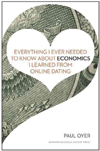Book review: Everything I Ever Needed to Know about Economics I Learned from Online Dating
Book review: Everything I Ever Needed to Know about Economics I Learned from Online DatingCan economic theory help you to find love? Matthew Partridge reviews Paul Oyer's new book that sets out to prove it can.

Get the latest financial news, insights and expert analysis from our award-winning MoneyWeek team, to help you understand what really matters when it comes to your finances.
You are now subscribed
Your newsletter sign-up was successful
Want to add more newsletters?

Twice daily
MoneyWeek
Get the latest financial news, insights and expert analysis from our award-winning MoneyWeek team, to help you understand what really matters when it comes to your finances.

Four times a week
Look After My Bills
Sign up to our free money-saving newsletter, filled with the latest news and expert advice to help you find the best tips and deals for managing your bills. Start saving today!

Published by Harvard Business Review Press (£16.99)
The failure of many economists to anticipate the financial crisis six years ago tarnished the field's reputation in the eyes of many.However, even if policymakers can't agree on a solution to the stagnation in Europe, Professor Paul Oyer of Stanford University thinks that economic theory may still help you to find love.
MoneyWeek
Subscribe to MoneyWeek today and get your first six magazine issues absolutely FREE

Sign up to Money Morning
Don't miss the latest investment and personal finances news, market analysis, plus money-saving tips with our free twice-daily newsletter
Don't miss the latest investment and personal finances news, market analysis, plus money-saving tips with our free twice-daily newsletter
With this in mind, Oyer's book uses the dating market to explain key principles of economics, details how we subconsciously follow them in our everyday lives, and even suggests some tips for finding the perfect partner.
The book is organised around nine chapters, each dealing with a separate principle. In some cases, it's easy tosee how these are related to dating,such as how the network effect determines the success and failure of dating sites. In others, Oyer employs some clever lateral thinking to link the two together.
For example, it's no secret that a lot of profile information (such as age and height) is either exaggerated or downplayed. However, the extent to which this occurs, and its effect on people's behaviour, can be explained by game theory.
Since the aim of the book is to entertain as well as to educate, it's lucky thatOyer is a warm and engaging writer.He has a knack for weaving in storiesand anecdotes to lighten the tone.
The theories he covers are explained in a clear and accessible way, meaning that the casual reader should be able to understand what he is saying.
Not all of Oyer's analysis is convincing. For instance, his discussion of how looser divorce laws have modified the incentives around marriage is a bit simplistic and one-sided.
Similarly, when he details research showing that people in bigger firms are better paid, he overlooks some plausible explanations, such as that they are more likely to get a share of the profits.
However, most of the time his insights are solid, and when the evidence is unclear for example, whether a college degree is merely a form of advertising he points this out.
Some readers may also find the book a little brief, at just over 200 pages. And those who buy this book thinking that they are getting a how-to guide to dating might also feel short-changed. Indeed, the suggestion that women "should make themselves beautiful" and that men "should get a raise" seems pretty obvious.
However, if you are willing to accept that online dating takes a back seat to economics, you're likely to find Oyer's book an entertaining read.
Everything I Ever Needed to Know about Economics I Learned from Online Dating by Paul Oyer. Published by Harvard Business Review Press (£16.99).
//
// ]]>
Get the latest financial news, insights and expert analysis from our award-winning MoneyWeek team, to help you understand what really matters when it comes to your finances.

-
 Average UK house price reaches £300,000 for first time, Halifax says
Average UK house price reaches £300,000 for first time, Halifax saysWhile the average house price has topped £300k, regional disparities still remain, Halifax finds.
-
 Barings Emerging Europe trust bounces back from Russia woes
Barings Emerging Europe trust bounces back from Russia woesBarings Emerging Europe trust has added the Middle East and Africa to its mandate, delivering a strong recovery, says Max King